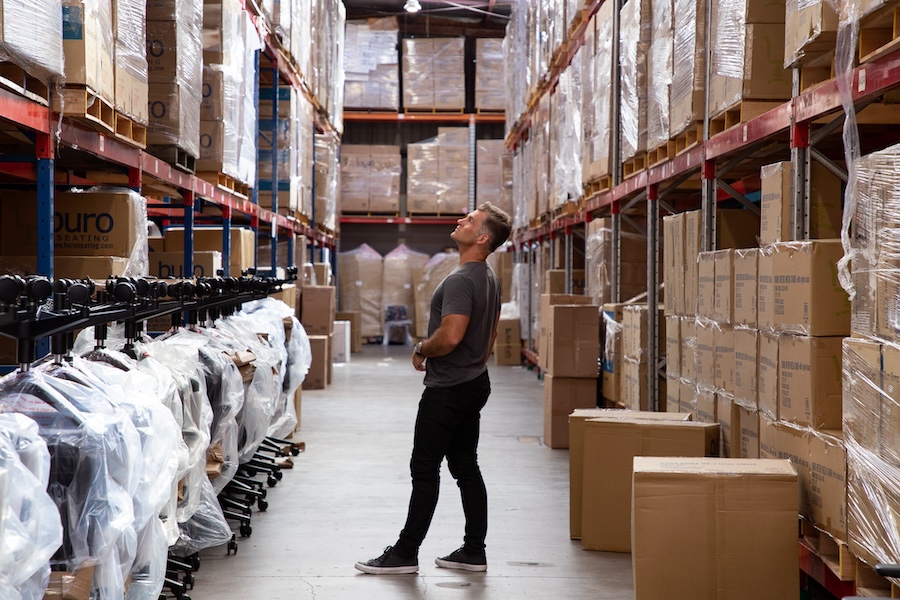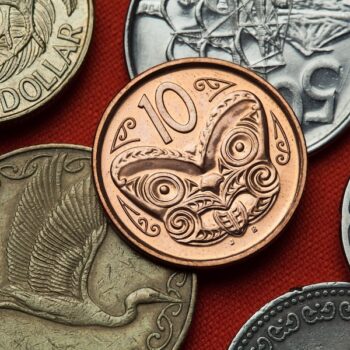Pictured above: Tim Howard in the Buro warehouse.
Boasting world-class design and smart technology, Buro has changed the way we work, for the better. The soon-to-be 30-year-old wholesaler of ergonomic office seating, with operations across Australasia, has revolutionised how we sit. Following a recent rebrand reflecting a diversification in its offering and new global ambitions, NZBusiness sat down with General Manager Tim Howard for a discussion on business, wellbeing and a changing world.
From humble beginnings in Auckland and Christchurch, Buro Seating was founded in August 1994 by entrepreneur David Boyd. After initial success in selling computer furniture and accessories, such as lineflow printer trolleys, paper hangers, rotafiles, and other key office equipment, Boyd saw a gap in the market for high-quality, ergonomic task chairs and set out to fill it.
Boyd built his business around two simple promises: ergonomics and quality. Today, Buro is a leader in quality office furniture across Australasia.
“David was the first furniture wholesaler in the commercial office venture space to bring a 10-year warranty to the market,” says Tim Howard, who has been with Buro for almost 20 years.
This warranty was more than just a marketing strategy; it was a testament to the company’s confidence in the durability and quality of its products.
“David recognised an opportunity in the market to bring to New Zealand a product that was good quality, relatively easy to assemble, but probably most importantly, was ergonomically better than a lot of the products in the market at that time,” says Howard of the brand’s initial offerings.
“The business model that David introduced to New Zealand was very simple, you ordered a chair and you got a chair in a box, that was easy to assemble.” As an early mover with a straightforward business model that prioritised product quality, Buro found great success in its early days with few barriers.
Buro’s first product range featured a version of the Buro Persona, the Buro Persona MK2 and MK3, which are still top-selling chairs in the Buro range today. This enduring popularity is a testament to the company’s commitment to innovation and wellbeing.
Boyd sold the business in 2005 and at this time, Tim Howard was employed as General Manager.
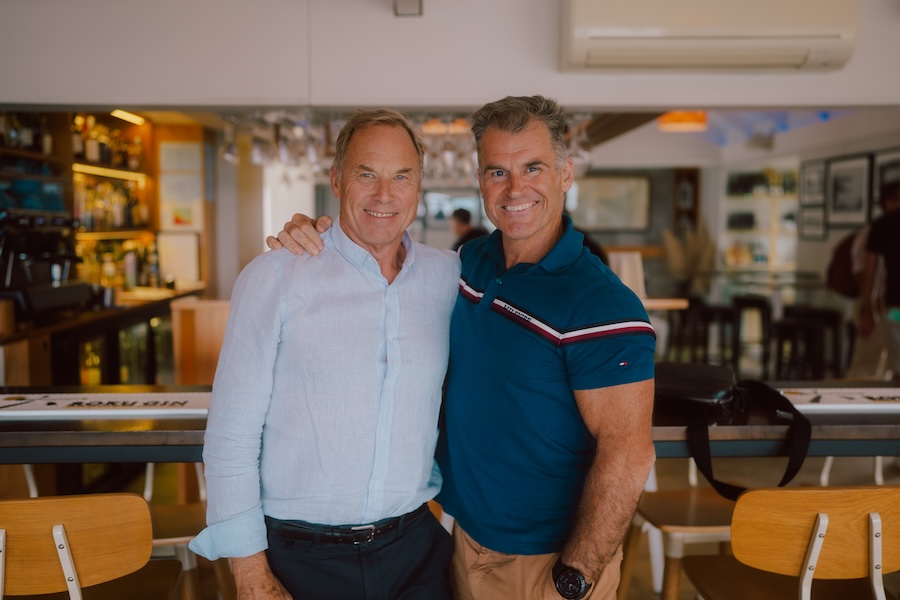
Since then, Buro’s product offering has expanded significantly to meet the diverse needs of modern workplaces. The range now includes ergonomic task chairs, executive seating, meeting room chairs, soft seating, and other innovative solutions designed with the end user in mind. The emphasis on ergonomics and comfort is evident across all product lines, catering to all kinds of work environments.
Buro’s commitment to innovation extends beyond its products to the strategic partnerships and research initiatives the company prioritises. Collaborations with industry experts and organisations play a crucial role in maintaining the brand’s edge in ergonomic design. One notable partnership is with the Australian Physiotherapy Association (APA), which independently assesses Buro’s products.
“We wanted an independent third party to be looking at our products,” Howard says. “The APA has been instrumental in ensuring our products meet the highest standards of ergonomic design.”
In New Zealand, Buro works closely with Andrew Wilson, a leading osteopath and ergonomist. His assessments and insights have guided the company in refining its product offerings to better meet the needs of evolving workspaces.
Howard says that design inspiration is drawn from global trends, particularly from Europe and Asia. “We find a lot of the trends that are probably more relevant for the Australia and New Zealand market are coming out of Europe. So we tend to follow that. Out of Asia, there are some really good designers currently [who are] pushing the boundary in terms of technology and what you can develop in terms of ergonomic chairs.”
Navigating a new era of office spaces
In addition to consulting experts in the market, Buro’s business approach is also deeply rooted in listening to its customers and understanding their needs, using this feedback to drive product development.
By prioritising the creation of a high-quality, customer-centric product that addressed a clear market need, Buro has thrived in New Zealand. Looking to grow the brand, an Australian expansion was a natural progression, but not without its own set of challenges.
In 2009, Buro opened its doors in Brisbane followed by the launch of the first of its Konfurb branded products, including the Konfurb Searl visitor chair which is still a part of the range today.
Howard explains the struggle in aligning the branding across the two markets, “We worked with distributors in Australia initially, but quite quickly became frustrated by that.” Buro had to be vigilant about maintaining visual consistency when working with different partners across Australia.
“We’re pretty passionate about our brand. And we wanted control of that.”
The transition from ‘Buro Seating’ to simply ‘Buro’ in 2023 marked another significant brand move.
“We’ve made a real statement in the market as being a seating specialist,” Howard explains. However, businesses and their goals change over time. “As our business evolved, we were drawn more into providing a [holistic] workplace solution.” This shift wasn’t merely about rebranding but about aligning the company’s identity with its expanded offerings.
Realigning the brand identity was a challenging and confronting move for the business, necessitated by the rapid adoption of new working models brought on by the pandemic.
‘Hybrid working’ was a constant buzzword during the COVID-19 era, but many businesses didn’t know what they really needed to adapt to this new model. Recognising this need, Buro introduced the Koplus brand, offering innovative office furniture that seamlessly bridged the gap between traditional office setups and modern hybrid environments. This is where Buro had to really step in, taking up a thought leadership role in the industry.
By promoting flexible and sustainable soundproof pods and meeting booths through the Koplus brand, Buro guided businesses in creating workspaces that catered to both in-office and remote work needs, ensuring seamless transitions and enhanced productivity.
“New Zealand [and] Australia, is made up of a lot of SMEs who don’t have massive cash flow to spend on transforming an office,” explains Howard. Buro works to help businesses understand the importance of implementing workplace solutions and that you can do it on a budget.
“It’s largely about saying you don’t need to refit your whole office, but have you thought about, perhaps, replacing 10 or 15 desks in the corner with a soundproof booth,” he continues. The goal is to show you can create a dedicated space for collaboration or focused work on a relatively inexpensive budget.
“If you’re like me, you’ve spent 20 years building a brand, so it’s something that’s really personal,” says Howard, advising other brands undergoing a similar transformation, “spend the time getting it right and being really clear about your brand positioning before you take any steps to go to market.”
The most crucial aspect of such a transformation is the involvement of the business itself. “Talk to your team, consult internally. You know, consultants are great, and using marketing consultants is great, but at the end of that, this is your brand. It’s not theirs.”
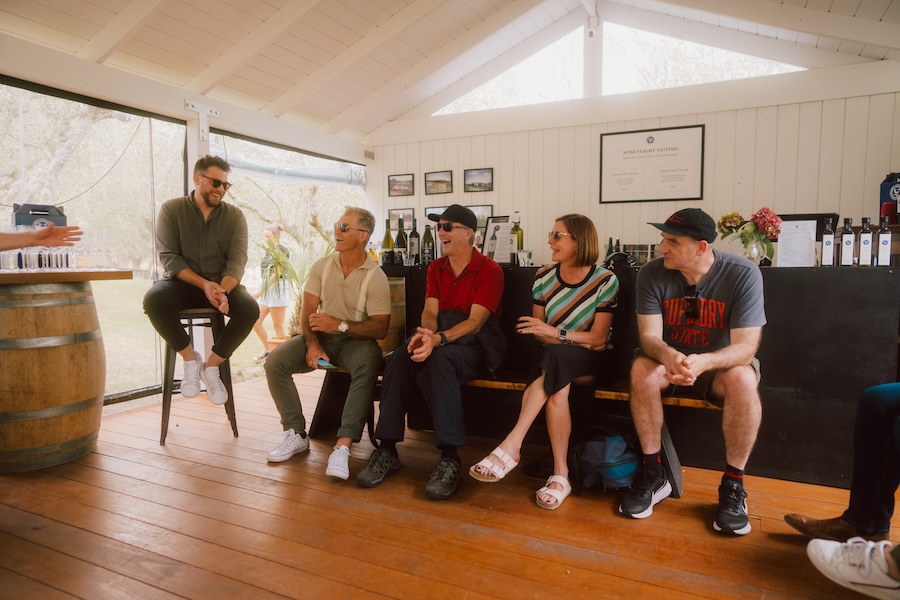
Looking toward the future
In 2025, Howard will have been at Buro for 20 years, and his leadership style and approach to business has evolved over this time. “It was an interesting role to come into,” he recalls. “Initially, the biggest challenge we faced was that we wanted to grow. We wanted to grow rapidly.”
Reflecting on his time, he says, “my leadership style in the early days was certainly tending more towards an authoritative approach.”
Today, he approaches his role in a more participative way, with the help of a robust leadership team around him. He says it’s all about the empowerment of people.
“People have a sense of belonging when they’re empowered and, you know, can make a difference,” Howard says. “We don’t have what I would call a blame culture in our business. I’m the first to put my hand up and say, ‘I’ve made a mistake.'”
In Howard’s eyes, a mistake is not something to be chastised for; it’s likely a sign that someone has tried something different to go that extra mile. This positive, participatory culture has empowered the brand to grow while helping retain staff. “Our retention is probably, on average, a lot higher than most businesses. When we looked last time, our retention and longevity was about just over ten years for an employee,” he explains.
With an emphasis on innovation, Buro plans to launch new customisable products that meet the dynamic demands of modern workplaces, which reflects the brand’s commitment to expanding its global footprint and continuously enhancing its offerings.
Having just returned from NeoCon in Chicago, one of the world’s largest commercial interior design shows, Buro has introduced its Konfurb range to the US for the first time.
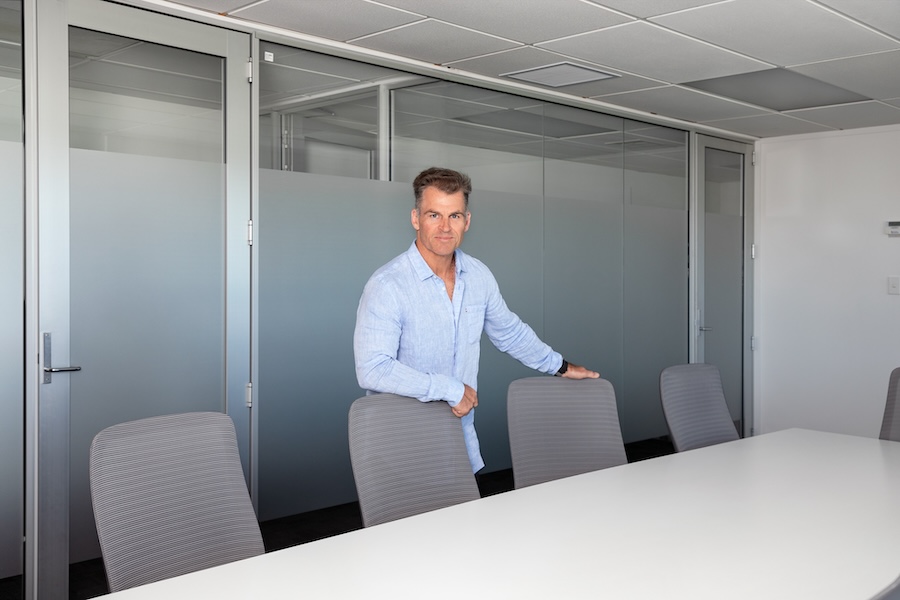
“It’s baby steps, but that’s the first foray into an international market,” explains Howard. “We’ll be interested to see what comes from it, and how the brand is received, and how the product offering is received.”
As Buro continues to evolve, its foundational principles of ergonomics and quality remain. With a robust leadership team, a participatory company culture, and a vision for the future, Buro is well-equipped to navigate the ever-changing landscape of workspace solutions. The early offering of a simple chair in a box has evolved into a mission to transform office environments across Australasia and beyond.

